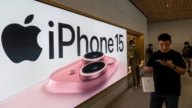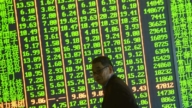【新唐人2013年05月15日訊】10號上午,審計署公布了包括3家國有銀行,和9家中央企業的2011年度財務收支審計結果。從審計結果看,這些企業都存在經營和財務問題。不過,這並不是問題的開始,同樣,也不是問題的結束。
以「中國移動」為例,不僅被曝光違規給員工發放金額龐大的「隱性福利」;還在招標採購方面存在滋養腐敗的灰色空間。另外,在重大經濟決策事項上,和內部管理上也存在嚴重問題。
這次被曝光的隱性福利、招標亂象、違規圈地、虛列項目、虛開發票等問題,實際上已經是中央企業人盡皆知的「頑疾」。同樣以「中移動」為例,自從2010年「中國移動」前黨組書記張春江被調查以來,「中國移動」至今被調查或者被「雙規」的高管已經達到13人之多,還不包括被地方檢察院調查,或者接受調查後又重新返回工作的人員。但顯然,之前的調查舉措並沒有收到效果。
指出央企的「頑疾」並不新鮮,新鮮的是,中共這次大規模的報導自家企業的醜事。
北京憲政學者陳永苗:「報導它的醜事,對它的統治來説,未必是一件壞事,而且是一件好事的時候,它一定會報導的。這些罪名都是空而無當的,對它無傷大雅。就像我們下像棋裏面一個『捨卒保車』一樣,當對它無關緊要的,痛駡一頓。」
香港專欄政論作家,《大公報》《大週刊》主筆兼新聞部主任朱健國指出,其實中央企業已經成爲當局權力派系各自的「封建領地」,因此對央企的打擊,可以看出中共背後的動向。
香港專欄政論作家朱健國:「它分封在不同派系,不同的派系它總會有矛盾,那麽強勢派就可能去曝光弱勢派的一些問題,也就會打著反腐的名義。實際上我想他們也不是真正的反腐,而是一種爭權奪利的新動向吧。」
有中國專家表示,如果只有審計清單而沒有問責清單,企業的種種違規行為根本不可能得到徹底根除。那麽,假設這次有了問責清單,是否就能徹底根除央企的「頑疾」呢?
朱健國:「那是不可能的,因爲審計部門它本身只是強勢權力者的一個工具而已。這麽多年來,審計署都是不了了之,報了一些,最後也沒有下文,更多的根本它就不敢報,也不敢審。在現有情況下,首先要能夠加強人大的權力,人大是監督政府的,它才可能真正有審計。沒有這個背景,其他都是虛的。」
中國媒體說,審計署報告發佈後,幾大央企紛紛在官網公布整改公告。
陳永苗:「它即使撤換掉幾個人,把它的書記,總經理撤掉,那替補他的人,一上去之後他還照樣幹他這些事情。它的制度是注定這樣的,誰都沒有辦法改變。」
時事評論員藍述指出,央企「頑疾」的關鍵並不在於企業,而是中共體制上行下效的「特權」。
時事評論員藍述:「實際上還是因爲他們有特權。在壟斷市場上他們有特權﹔經營上他們有政策的特權﹔在做一些違法的決定的時候,他們也有超越於法律之上的特權。所有這些特權加起來,就是這些現象的最根本。它是沒有辦法解決的,這是一個中共體制的問題。」
國內媒體說,針對這次審計風暴,公衆有太多的疑問需要解答。更應該追問,這麽多問題能否得到答案。
採訪/易如 編輯/尚燕 後製/李勇
Privilege: Real Reason for China’s SOE “Stubborn Ills”
On May 10th China’s National Audit Office released
its annual audit report of 2011.
The auditing covered three state-owned banks
and nine central state owned enterprises (SOE).
The audit result shows that all these SOE’s have
operating and financial problems.
This is not the only problem, there are other issues too.
China Mobile is one of these problematic SOE’s.
It has been exposed for paying large amounts of “implied
welfares” (bribes to staff behind the scenes).
The company’s bids & procurement
was a gray-area operation.
Serious problems exist in its major economic decisions
and management.
The audit exposed many “stubborn ills” that
have been with China’s SOEs for years.
These included bribes to staff, procurement malpractices,
illegal land occupation, fictitious expenditures and invoicing.
Zhang Chunjiang, China Mobile’s former Party chief, was
investigated by the Chinese Communist Party (CCP) in 2010.
Since then, 13 executives have been put
under the Party’s investigative detention.
It excluded those under criminal probes. It was clear that
the earlier investigation had produced little effect.
The exposure of “stubborn ills” did not surprise the public.
What was unusual was the CCP high-profile reporting of
the scandals from its own SOE’s.
(Beijing constitutional scholar) Chen Yongmiao: “If exposure
of the scandals is useful to its ruling, it will make it pubic.
Because these are all empty accusations, harmless to its image.
It’s just like sacrificing a pawn to save a castle in a chess game.
it gave them a good scolding, as its an insignificant issue.”
Political columnist, Zhu Jianguo, says China’s central SOE’s
have turned into feudal fiefdoms of the CCP factions.
Thus, the blow struck at these central SOEs
may reveal the CCP’s next move.
Zhu Jianguo: “These SOEs have been assigned to
different CCP factions.
Since there are conflicts among these factions,
the strong cliques may expose the weak ones’ problems.
They may do it in the name of combating corruption.
I don’t believe they really fight corruption,
which is just a new fashion of their infighting.”
Some Chinese experts have said without seeking
accountability, the SOEs’ irregularities won’t get eradicated.
Then, can it completely eradicate the SOE “stubborn ills”
by seeking accountability?
Zhu Jianguo: “That’s impossible, for the audit authority
itself is a tool of the ruling CCP interest group.
For decades, the auditing administration has just
reported it, but ended up doing nothing.
In fact, it dares not to report more irregularities that
have occurred, nor does it dare to audit them.
The current priority is to reinforce the power of
the National People’s Congress (NPC).
The auditing plays a role only when the NPC is
given the power to oversee the government.
Without this premise, all other acts are fictitious.”
According to China’s media after release of the official audit
report, several SOEs posted on their main websites to rectify.
Chen Yongmiao: “They may change the Party chiefs or
the general mangers.
New management will still follow the old path. Because
this is caused by the system, which no one can change.”
Critic Lan Shu points out that enterprises are not
the solution to the SOE “stubborn ills”.
The real reason is “privileges” that derive from
top CCP leadership, he says.
Lan Shu: “The real cause is that they have privileges.
They have privileges to monopolize the market,
and get favorable policies for business operations.
They can also enjoy privileges of escaping legal
punishment for their irregularities.
All these privileges form the fundamental reason
behind these phenomena.
The regime has no way to solve it, which is a matter
of the CCP’s political system.”
China’s media reported that the public have
too many questions that need answers.
But a further question is, whether these questions
will get answers in reality.



























